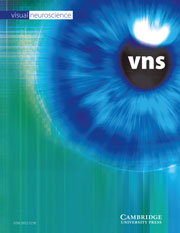Crossref Citations
This article has been cited by the following publications. This list is generated based on data provided by
Crossref.
Desimone, Robert
1996.
Neural mechanisms for visual memory and their role in attention.
Proceedings of the National Academy of Sciences,
Vol. 93,
Issue. 24,
p.
13494.
Nakamura, K.
and
Kubota, K.
1996.
The primate temporal pole: its putative role in object recognition and memory.
Behavioural Brain Research,
Vol. 77,
Issue. 1-2,
p.
53.
Miller, Earl K.
Erickson, Cynthia A.
and
Desimone, Robert
1996.
Neural Mechanisms of Visual Working Memory in Prefrontal Cortex of the Macaque.
The Journal of Neuroscience,
Vol. 16,
Issue. 16,
p.
5154.
Gibson, Jay R.
and
Maunsell, John H. R.
1997.
Sensory Modality Specificity of Neural Activity Related to Memory in Visual Cortex.
Journal of Neurophysiology,
Vol. 78,
Issue. 3,
p.
1263.
Orban, Guy A.
Dupont, Patrick
Vogels, Rufin
Bormans, Guy
and
Mortelmans, Luc
1997.
Human Brain Activity Related to Orientation Discrimination Tasks.
European Journal of Neuroscience,
Vol. 9,
Issue. 2,
p.
246.
Brown, M.W.
and
Xiang, J.-Z.
1998.
Recognition memory: neuronal substrates of the judgement of prior occurrence.
Progress in Neurobiology,
Vol. 55,
Issue. 2,
p.
149.
Xiang, J.-Z.
and
Brown, M.W.
1998.
Differential neuronal encoding of novelty, familiarity and recency in regions of the anterior temporal lobe.
Neuropharmacology,
Vol. 37,
Issue. 4-5,
p.
657.
Wiggs, Cheri L
and
Martin, Alex
1998.
Properties and mechanisms of perceptual priming.
Current Opinion in Neurobiology,
Vol. 8,
Issue. 2,
p.
227.
Orban, Guy A.
and
Vogels, Rufin
1998.
The neuronal machinery involved in successive orientation discrimination.
Progress in Neurobiology,
Vol. 55,
Issue. 2,
p.
117.
Brown, Malcolm W.
and
Aggleton, John P.
2001.
Recognition memory: What are the roles of the perirhinal cortex and hippocampus? .
Nature Reviews Neuroscience,
Vol. 2,
Issue. 1,
p.
51.
Suzuki, Satoru
2001.
Attention-dependent brief adaptation to contour orientation: a high-level aftereffect for convexity?.
Vision Research,
Vol. 41,
Issue. 28,
p.
3883.
Jessen, Frank
Manka, Christoph
Scheef, Lukas
Granath, Dirk‐Oliver
Schild, Hans H.
and
Heun, Reinhard
2002.
Novelty detection and repetition suppression in a passive picture viewing task: A possible approach for the evaluation of neuropsychiatric disorders.
Human Brain Mapping,
Vol. 17,
Issue. 4,
p.
230.
Suzuki, Satoru
and
Grabowecky, Marcia
2002.
Evidence for Perceptual “Trapping” and Adaptation in Multistable Binocular Rivalry.
Neuron,
Vol. 36,
Issue. 1,
p.
143.
Parker, Andrew
Derrington, Andrew
Blakemore, Colin
Brown, M. W.
and
Bashir, Z. I.
2002.
Evidence concerning how neurons of the perirhinal cortex may effect familiarity discrimination.
Philosophical Transactions of the Royal Society of London. Series B: Biological Sciences,
Vol. 357,
Issue. 1424,
p.
1083.
DiCarlo, James J.
and
Maunsell, John H. R.
2003.
Anterior Inferotemporal Neurons of Monkeys Engaged in Object Recognition Can be Highly Sensitive to Object Retinal Position.
Journal of Neurophysiology,
Vol. 89,
Issue. 6,
p.
3264.
Suzuki, Satoru
and
Grabowecky, Marcia
2003.
Attention during adaptation weakens negative afterimages..
Journal of Experimental Psychology: Human Perception and Performance,
Vol. 29,
Issue. 4,
p.
793.
Sawamura, Hiromasa
Georgieva, Svetlana
Vogels, Rufin
Vanduffel, Wim
and
Orban, G. A.
2005.
Using Functional Magnetic Resonance Imaging to Assess Adaptation and Size Invariance of Shape Processing by Humans and Monkeys.
The Journal of Neuroscience,
Vol. 25,
Issue. 17,
p.
4294.
Wheatley, Thalia
Weisberg, Jill
Beauchamp, Michael S.
and
Martin, Alex
2005.
Automatic Priming of Semantically Related Words Reduces Activity in the Fusiform Gyrus.
Journal of Cognitive Neuroscience,
Vol. 17,
Issue. 12,
p.
1871.
Goolsby, Brian A.
Grabowecky, Marcia
and
Suzuki, Satoru
2005.
Adaptive modulation of color salience contingent upon global form coding and task relevance.
Vision Research,
Vol. 45,
Issue. 7,
p.
901.
Sato, Takayuki
2005.
Effects of learning on color-form conjunction in macaque inferior temporal neurons.
Experimental Brain Research,
Vol. 162,
Issue. 3,
p.
265.


